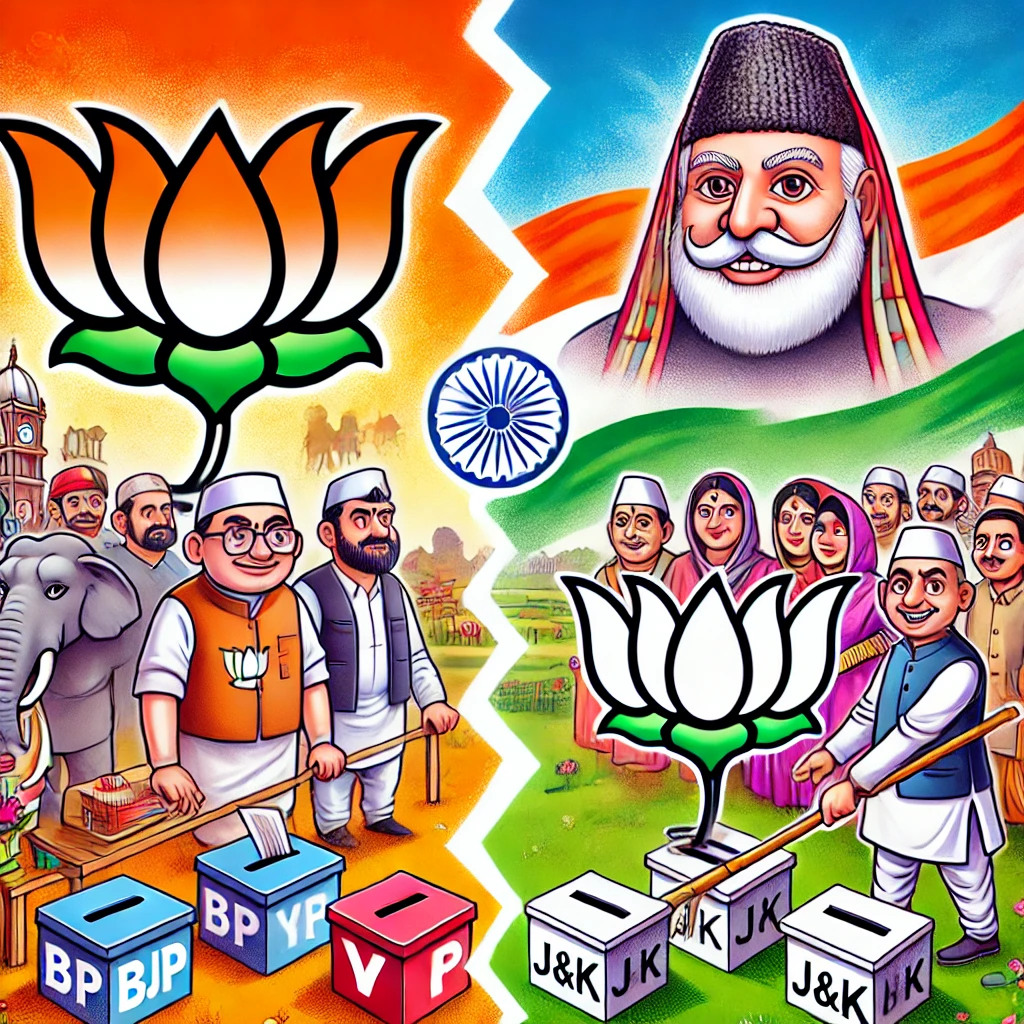The 2024 Assembly elections in Jammu & Kashmir (J&K) and Haryana have left the political landscape of India buzzing. While Haryana saw a historic third consecutive win for the Bharatiya Janata Party (BJP), the elections in J&K were monumental for their symbolic significance, marking the first since the abrogation of Article 370 in 2019. These elections reflect not just political outcomes but the evolving trust of the people in democratic processes, amid challenges of governance and contentious claims by opposing parties.
Historical Context: J&K’s First Assembly Election Since Article 370
For J&K, this election was more than just about seats and governance; it symbolized the resumption of political normalcy in a region that has endured turmoil for decades. It was the first election after the scrapping of Article 370 and the bifurcation of the state into two Union Territories in 2019. The move to revoke the special status of J&K had led to widespread protests, with many expressing concerns over political disempowerment.
However, the turnout in these elections reflected a significant shift in public sentiment. Voters in both Jammu and Kashmir embraced the electoral process, signaling a move away from narratives of alienation and boycotts that have often marred political engagement in the region. The National Conference (NC), led by Omar Abdullah, emerged victorious in alliance with the Congress, winning 49 out of 90 seats, a clear majority in the region. This win indicates that, despite years of political instability, the people of J&K still believe in the power of the vote.
Key Statements
Prime Minister Narendra Modi hailed the peaceful conduct of the J&K elections as a “victory of the Indian Constitution and democracy.” He emphasized that the polls signified a restoration of democratic norms in the region.
On the other hand, Omar Abdullah, the NC leader, reflected on the challenges ahead, particularly with the limited powers of the J&K Assembly. In an interview before the elections, he expressed concerns over the potential friction with the Lieutenant Governor (L-G), who retains significant powers under the Jammu and Kashmir Reorganisation Act of 2019. However, Abdullah has now committed to working towards achieving a “balance” with the L-G to fulfill the aspirations of the people.
The BJP’s Grip in Haryana: A Hat Trick Amidst Controversies
In contrast to J&K’s fresh political engagement, Haryana presented a picture of political continuity. The BJP’s win for a third consecutive term was remarkable, especially considering its recent underwhelming performance in the 2024 Lok Sabha elections. The BJP won 48 seats in Haryana, two more than the majority mark, while the Congress secured 36 seats.
However, the results were not without controversy. Congress leaders, including Rahul Gandhi and Mallikarjun Kharge, raised concerns about the fairness of the election. The Congress alleged that Electronic Voting Machines (EVMs) were tampered with, a claim that is seen by many as an act of “sore losing” rather than a substantive argument.
Bhupinder Singh Hooda, the face of the Congress campaign in Haryana, initially accepted the results, acknowledging his party’s defeat. However, this stand was contradicted by the central leadership’s challenge of the outcome, which some analysts believe may hurt the party’s credibility in future elections.
Opinions on Congress’s Strategy
The Congress’s decision to challenge the election result in Haryana has sparked a broader debate about the role of political parties in accepting democratic processes. While it is essential to address legitimate concerns, questioning the entire electoral system in the absence of compelling evidence can backfire, eroding the faith of the very voters the party seeks to represent.
Rahul Gandhi’s party has been advised to take a step back and reconsider its approach. While expressing disappointment with the results is expected, indulging in conspiracies might alienate voters in the long run. Political analyst Rajesh Singh notes, “By contesting the election results in Haryana, the Congress is shifting focus away from the hard work required in governance, especially in J&K, where they have an opportunity to make a real difference.”
Human Impact and Voter Sentiments
In J&K, the human element is key to understanding the significance of the election. Many voters, especially in the Kashmir Valley, viewed the election as a chance to reassert their political agency after years of uncertainty. Zahid Malik, a young shopkeeper from Srinagar, shared, “For years, we felt voiceless, especially after 2019. This election was our chance to speak, to show we still believe in democracy.”
In Haryana, the political discourse was shaped by concerns over unemployment, agricultural issues, and caste-based politics. However, the BJP managed to secure a wide coalition, cutting across caste lines, especially by mobilizing support from non-Jat OBCs. The Congress, despite gaining vote share, was unable to break the BJP’s urban stronghold.
Future Implications
- J&K’s Path Forward: Omar Abdullah and his Congress allies now face the challenge of restoring public trust in governance, particularly with the limited powers the J&K Assembly has post-Article 370. The immediate focus will be on negotiating with the Centre to restore full statehood, a demand echoed by many political leaders in the Valley. As Abdullah mentioned, the goal is to strike a fine balance with the Lieutenant Governor to ensure peace and development.
- Haryana’s Political Trajectory: The BJP’s victory in Haryana, though impressive, also leaves the Congress in a reflective position. With major losses in rural areas despite successful farmer-led agitations, Congress must re-evaluate its strategy, especially in forming coalitions and addressing the aspirations of non-Jat communities. As Haryana heads towards future elections, the BJP will look to maintain its hold, while the Congress needs to consolidate its base and provide stronger opposition.
Conclusion
The 2024 Assembly election results in J&K and Haryana offer a snapshot of India’s evolving political landscape. For J&K, it marks the return of electoral democracy after a decade of uncertainty, while in Haryana, it reaffirms the BJP’s ability to navigate complex social dynamics and retain power. Both states have lessons for the future, but the onus now lies on their political leaders to turn electoral victories into effective governance that addresses the real concerns of their citizens.
Sources:
- The Indian Express https://indianexpress.com/article/opinion/editorials/express-view-on-haryana-jk-poll-results-two-decisive-wins-one-sore-irresponsible-loser-9610836/
- The Hindu https://www.thehindu.com/elections/bjp-scores-a-hat-trick-in-haryana-national-conference-led-alliance-wins-jk/article68733664.ece




